A Day in Nemea: Good Wine and Ancient...
Why not try a brief getaway...
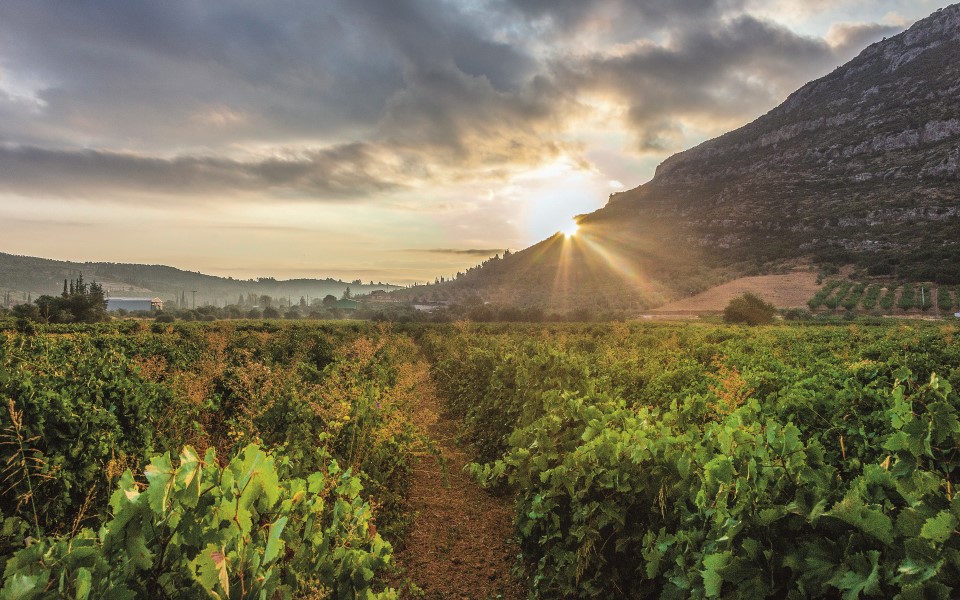
Grape vines in Nemea.
© Perikles Merakos
We planned a road trip to five wine-producing regions in the Peloponnese with the aim of meeting pioneer viticulturists implementing innovative techniques, as well as cosmopolitan winemakers who love gastronomy, art, warm hospitality and fine living in general.
In all, we visited seven wineries, where we sampled excellent wines from both indigenous and foreign grape varieties, which thrive in the region’s terroir.
However, beyond the wine we also had another reason to visit these wineries: their incredible locations: Here, wine tourism can be combined with explorations of important archaeological sites, hikes through a rich natural world and tours around beautiful villages.
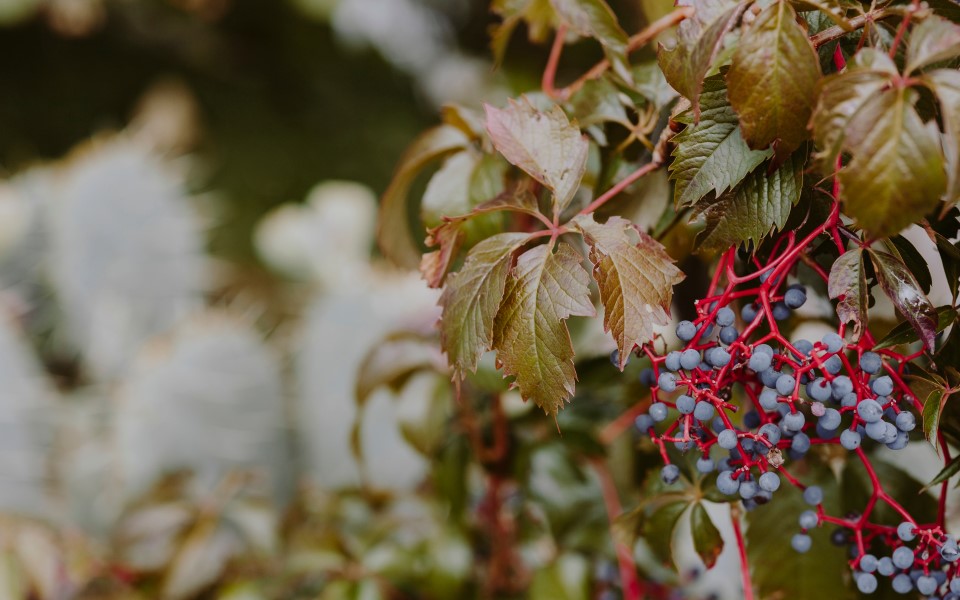
Corinthian currants on a vine.
© Shutterstock
Our journey began and ended in Corinthia, with a last stop at Nemea – which we discuss separately below due to its terroir’s particular features and great wines.
Leaving Ancient Corinth behind us, we followed the Olympia Odos motorway towards Kiato. The sea, vineyards, and olive trees dominate the landscape – indeed, the fruitful land that stretches out here is famous for its currants (the word is derived from Corinth), which are inscribed on the National Inventory of Intangible Cultural Heritage of Greece.
First stop: Papargyriou Estate, in the village of Laliotis (10km from Kiato). Its newly built stone winery will start welcoming the public once the Covid-19 lockdown has passed. As we visited in the midst of the harvest, everyone was busy, with the works for the new winery being carried out at the same time.
We took a tour of the restaurant and tasting area, where visitors post-lockdown will be able to try out five different wines along with cheese and cold cuts. What could be better than enjoying the view on the new roof garden while drinking a white Papargyriou Blanc or a red Vinum Curtium?
We were guided around the oldest vineyard on the estate, located in a nearby terraced valley, and listened to Giannis Papargyriou tell the story of The King of the Mountains, a novel by French author Edmond About which describes Greece in the years of King Otto with sharp humor; it has given its name to two of the estate’s flagship wines: Le Roi des Montagnes Cuvée and Le Roi des Montagnes Syrah.
Papargyriou informed us that in the estate’s newest vineyard in Sofiana, near Xylokastro, at an elevation of 850m, foreign varieties such as Sauvignon Blanc, Syrah and Cabernet Sauvignon are grown next to the Moschoudi and Assyrtiko grapes.
Τip: Take a stop at the village of Ancient Corinth, its archaeological site and museum. Have a picnic along the millrace in the village of Evrostina, close to Derveni: The beautiful brook lends itself to walks amid a lush natural setting.
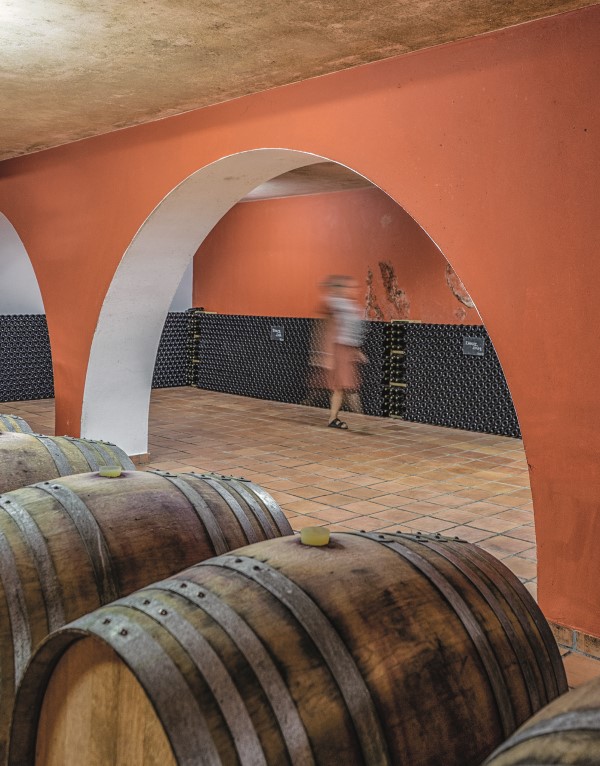
Barrels in the cellar of the Rouvalis Winery with bottles from older harvests in the background.
© Marika Tsouderou
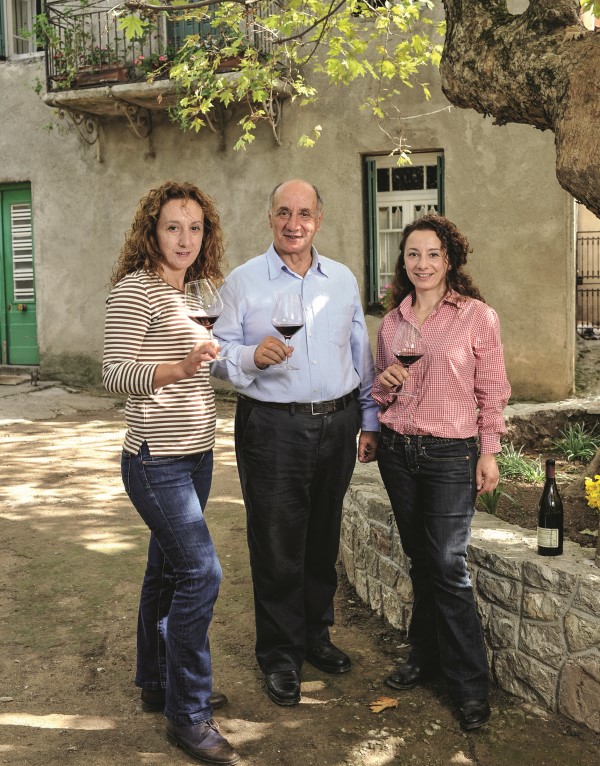
Thanasis Parparoussis with his daughters Dimitra and Erifili at the winery’s estate.
© Vangelis Zavos
Our next stop is the Rouvalis Winery, on the mountain slopes of Aigialeia. Theodora Rouvalis and her Spanish husband, Antonio Ruiz Panego, are seeking to rebrand the winery with fresh ideas and premium labels. Their vineyards extend from Lampiri to Akrata on the slopes of four mountains and at elevations of up to 1,100m. By cultivating their vines on steep hillsides, they have become ambassadors of heroic viticulture, which involves vineyards that are difficult to care for and maintain due to their location and landscape.
We tried the Syrracho, consisting of a fruity Viognier partnered with a robust mountainous Roditis to produce a dry wine with a bright yellow color. Theodora, who has gathered experience from wineries in Spain, Chile, New Zealand and France, continues the innovative spirit of her father, Angelos Rouvalis; he built this model gravity-flow winery that does not use pumps for the different vinification stages but, instead, the natural power of gravity.
Theodora maintains that the region’s geography creates a microclimate which is key to a successful product. Grapes whose taste is enriched by the sea air, in vineyards on small and protected slopes, which yield small quantities of excellent quality: this is what the family focuses on. It creates new premium labels by experimenting with old, classic varieties.
They are attempting to do just this with the mountainous Roditis and the Tsigello, an old Mavrodaphne clone that is aged in modern amphorae; legally, a dry wine cannot be called Mavrodaphne so they revived this specific variety – which might have a low yield but is of great quality. Back at the winery, you can enjoy a tasting of either 4, 8 or 14 wines, paired with food platters.
Τip: Aside from its wines, the area is ideal for tours any time of the year. Vouraikos Gorge, Kalavryta – with its ski center and rack railway – as well as the beaches of Aigialeia are located within a short distance. If you keep going towards Patra, enjoy a glass of Mavrodaphne of Patras at the historic Achaia Clauss winery (Tel. +30 2610.527.089) or at the magnificent Parparoussis Winery, in Proastio (more commonly known by its former name of Bozaitika). In the latter, aside from Mavrodaphne, you must ask for a dry Sideritis Petite Fleur rosé – it is fresh and revitalizing like no other.
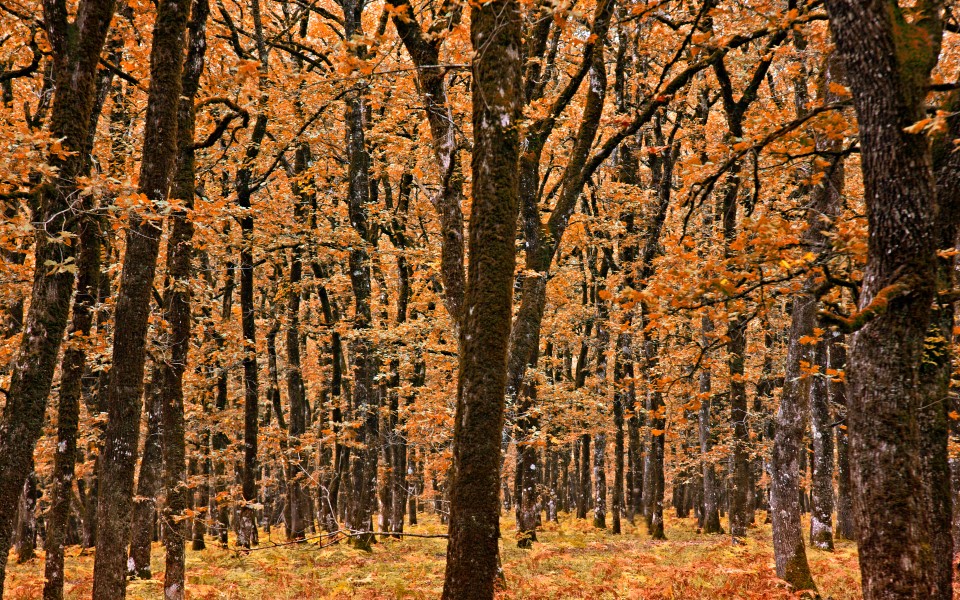
The enchanting Foloi oak forest in autumn.
© Shutterstock
Our final destination in the region of Ilia was Korakochori, approximately 4km away from Katakolo, and more precisely, the Mercouri Estate, one of the oldest and most beautiful wineries in the country. It is an ideal place for those who love good wine and nice family stories.
The vines located on the right upon entering the estate are of the Refosco variety; Theodoros Mercouri brought the first cuttings from Friuli, northern Italy, in 1870. A few years later, the cosmopolitan businessman erected the first building on the estate, influenced by Italian architecture; today, visitors are still charmed by it.
Sitting at the big wooden table under the pine trees, surrounded by peacocks freely roaming around, adding color and character to the picture, made us feel like we were in a period movie. It was an ideal moment for a classic and fruity Ktima Mercouri red – made from Refosco and Mavrodaphne varieties – or a Foloi white, as we chatted with enologist Dimitris Kanellakopoulos about this unusual year.
“From a production point of view, we had a smaller crop but within reason. Fortunately, it has been a favorable year for crops, without any diseases, and it gave us very good quality grapes. We saw a bigger difference in tours and tastings. Here, we usually work with groups traveling by ferry that stop to visit Ancient Olympia, and with different event planners for celebrations such as weddings. Naturally, because of the pandemic, everything was kept to a minimum.”
The estate usually offers tasting packages to groups on organized tours.
Τip: Combine your visit to the Mercouri Estate with a stop at Ancient Olympia and its museums. If time allows, take a walk around the Foloi oak forest, which forms part of the Natura 2000 network. The forest, which extends over thousands of acres, rewards visitors with incredible images every season of the year.
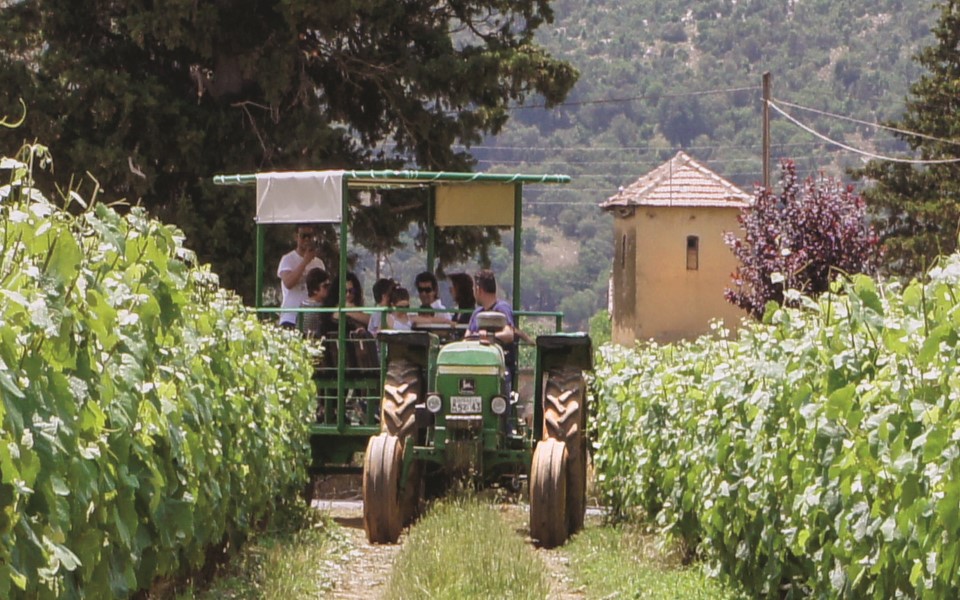
A tour of the vineyards of Troupis Winery.
© Marika Tsouderou
ARCADIA
On a Sunday morning, we took the provincial road connecting Ancient Olympia to Tripoli and headed for Mantineia. Over the approximately 115km we traveled, we only crossed paths with a group of cyclists; they were doctors from Athens, who like to hop on their bikes to explore Greece in their time off.
Driving in the beautiful nature of Gortynia, we ascended towards the Mantineia Plateau in the mountains at an elevation of 660m, where winters are intense and the renowned PDO Mantineia wine from 100 percent Moschofilero grapes is produced. There are a lot of excellent wineries in the region – including those of Boutari, Tselepos, Troupis and Spiropoulos – whose names are associated with extremely popular and beloved labels in Greece.
Most wineries in Mantineia can be visited from Mondays to Saturdays – keep this in mind when planning your trip. We were able to stop at the Troupis Winery after having called ahead. Panagiota Troupi filled our glasses with Tomi Mantineia, the winery’s PDO wine, Route 111 (from Agiorgitiko and Mavrodaphne grapes), which was awarded in the 50 Great Greek Wines 2020 competition, and Hoof & Lur, a modern, rosé version of Moschofilero, with aromas of flowers and dried herbs, a sharp acidity and a mineral aftertaste.
The winery focuses on Moschofilero grapes, which are vinified using an original technique, inside clay pots and concrete tanks; this gives the wine a long, characteristic mineral aftertaste. Hoof & Lur, Route Gris and Ekato – a complex rosé exclusively exported to the US – ferment and mature in these vessels. During the tour – of the vineyard as well as the winery – you will be introduced to the world of Moschofilero and Mantineia grapes, and you will have the chance to taste all nine labels of the winery.
Τip: Lagadia, Vytina and the rest of the villages in Gortynia are located a convenient distance from each other. A visit to the Mantineia vineyards constitutes a first-class excuse to enjoy Arcadian nature and the beauties of Mt Mainalo. However, do not miss out on the opportunity to visit Kapsia Cave, which is among most remarkable in Greece.
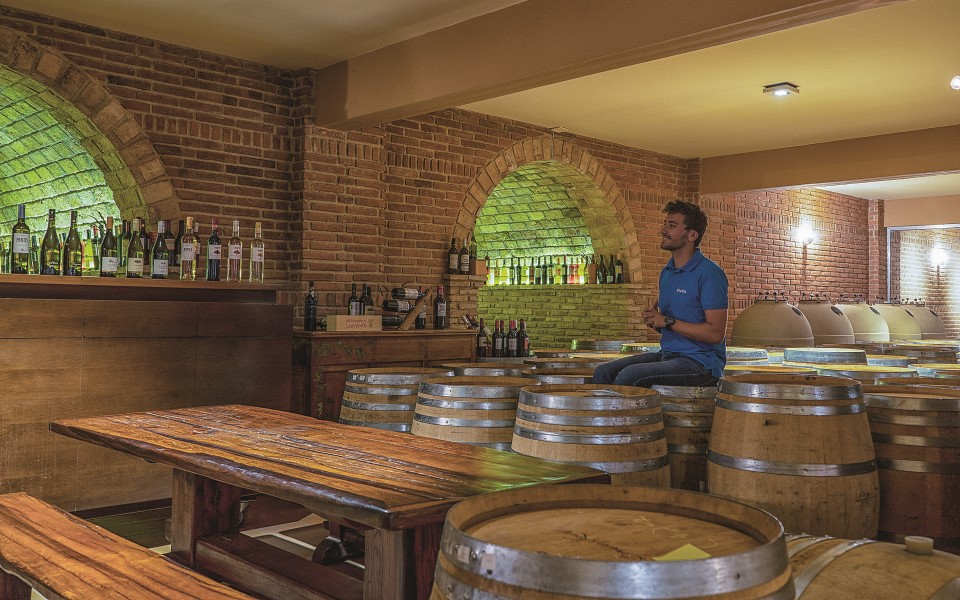
Dimitris Skouras talks about the harvests that are maturing in the cellar of the family winery.
© Marika Tsouderou
Dimitris Skouras was waiting for us at the door of Domaine Skouras in Malandreni, Argos. Even though the winery is located in Argolida, it belongs to the Nemea PDO wine region.
It was the beginning of September, and the grape crates had just arrived from the vineyards; everybody was helping to sort the bunches and bring them to the first tank, away from the heat. The workload was heavy, but everyone welcomed us warmly. We stood there for a bit before moving on to the cellars, where the low temperatures made us rapidly yearn for the burning heat of noon again.
Throughout the winery, George Skouras has displayed the charming collection of artwork he has amassed. Being an art lover, Skouras wanted to stimulate more than just one of his visitors’ senses, and decided to offer them an experience that would also be visual.
“We often organize exhibitions and meetings with artists here,” Skouras says. He and his sister Stella form the third generation of winemakers in the family.
They spoke to us about their new e-shop, where one can order old vintages that are no longer on the market. They specified which varieties and vintages age in barrels in the cellar and explained their characteristics.
Going back to the tasting room, we cooled off with a glass of Peplo rosé – but also a Dum Vinum Sperum Chardonnay, the first wine in Greece to be bottled with a screw cap. The Megas Oenos remains one of the winery’s most iconic wines. If, however, you want something more daring, ask for a Viognier – such as the Eclectique, which is akin to a citrus and tropical fruit dance in your mouth. The tasting comprises four different labels accompanied by grissini and graviera cheese.
Τip: Visit the archaeological sites of Mycenae, Ancient Tiryns, Lerna and Epidaurus, which are all near the seaside town of Nafplio.
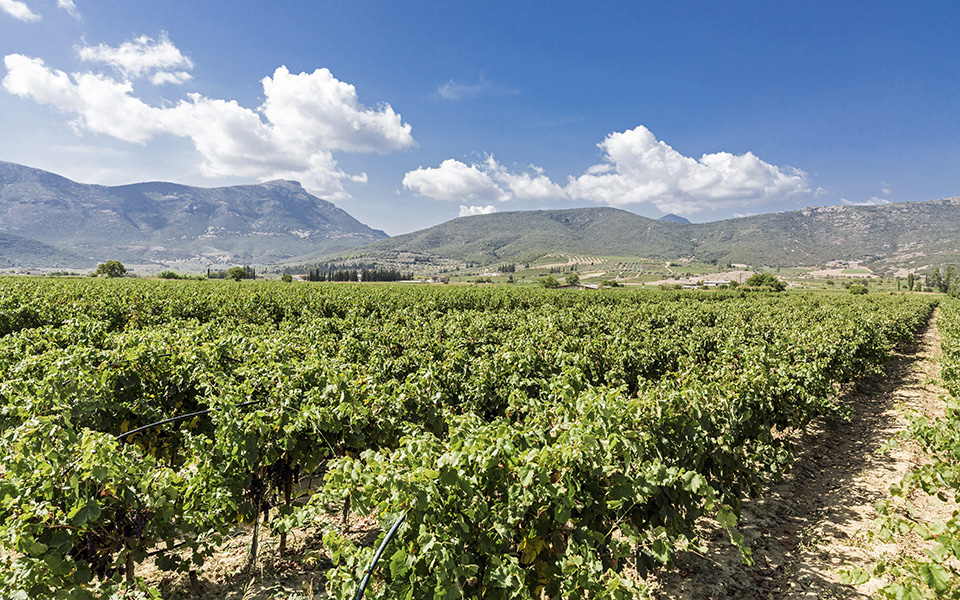
Mazos vineyards in Nemea.
© Dionysis Kouris
Our road-trip in the Peloponnese wouldn’t have been complete without one – or more – stops in Nemea. A famous wine destination in and of itself, the region boasts some of the most famous Greek wineries.
Here, our wine journey began with the mythical demigod Heracles, who strangled the Nemean Lion as one of his 12 labors and was offered wine made from black grapes by a nymph. The wine from the ancient city of Phlius that was served at the Nemean Games is associated with today’s PDO Nemea wine, which is produced from 100 percent Agiorgitiko grapes and, depending on its production zone – mountainous, semi-mountainous, lowland – varies in complexity.
The PDO zone comprises 16 villages and over 40 wineries, including Nemeion, Ieropoulos, Palivos, Semeli, Gaia, Lafazanis and Lantides. The road runs alongside vine-planted slopes, and makes for easy hopping from one winery to the next.
We stopped at Gofas Winery; its beautiful tasting area next to the river allows visitors to maintain a safe distance and thus enjoy a carefree tasting. The wine tasting normally takes place immediately after a tour of the winery’s halls and vineyard; it comprises 2, 4 or 8 wines accompanied by a platter. In the company of enologist Anna Georgoulaki, we tried the 2018 Romeo+Juliet, a blend of Chardonnay and Malagousia varieties; in the end, we stayed longer than expected, listening to wonderful wine stories.
Due to the Covid-19 pandemic and the current lockdown imposed in Greece, wineries are temporarily closed to the public.
Read our A-Z guide on the new measures and restrictions put in place by the government to stay updated once the situation evolves.
Why not try a brief getaway...
When the summer crowds depart, Greece’s...
Whether by foot, car, or the...
Landscapes of wild beauty, legendary vendettas,...